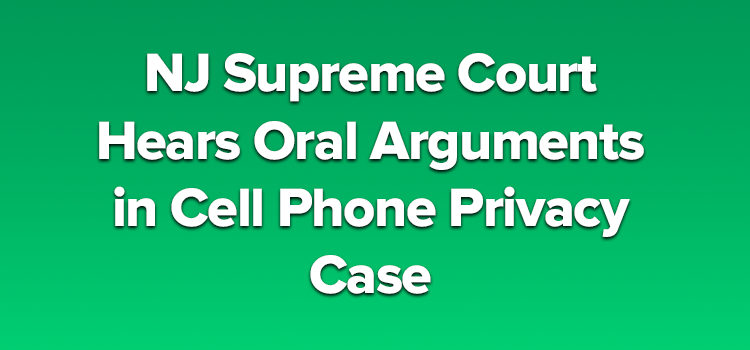The Supreme Court of New Jersey recently heard oral arguments in a closely-watched Fifth Amendment case. The issue in State v. Andrews is whether the defendant can be forced to turn over the passcode for his encrypted iPhone. During oral arguments, Justice Barry Albin acknowledged that the case “could cause the court to diverge on constitutional amendments” and have a seminal impact.

Defendant Robert Andrews, who worked as an Essex County sheriff’s officer, was identified by a suspected drug trafficker as having helped him conceal his drug-trafficking activities. A trial court judge ordered Andrews to provide the PIN and passwords for his lawfully seized iPhones that he allegedly used to aid the drug-trafficker.
Andrews argued that the compelled disclosure of this information violates his right against self-incrimination under the Fifth Amendment to the U.S. Constitution, and the protections against self-incrimination afforded under New Jersey law. However, the Appellate Division sided with the government. It held that the trial court correctly found that compelled disclosure of the defendant’s passcodes does not violate the defendant’s Fifth Amendment privilege against self-incrimination. “Applying the privilege against self-incrimination to cell phone passcodes would essentially preclude the State from obtaining the contents of any passcode-restricted device as part of a criminal investigation,” Judge Joseph L. Yannotti wrote.
The Supreme Court must now decide whether the Appellate Division got it right. The specific issue before the Court is fairly straightforward: “Can a criminal defendant be compelled to disclose the passcode to his or her cellular phone?”
During oral arguments, Andrews’ attorney argued that “[t]he Fifth Amendment does not compel someone to give up the contents of their brain to further the state’s prosecution.”
He further argued, “I think this is a situation where the court can clearly articulate that we are a Fifth Amendment state and have protections in place. We don’t know what the future holds. You are protecting a private enclave—one’s thoughts.”
Several amici also argued in favor of overturning the Appellate Division decision. “Cellphones now contain a trove of personal information,” counsel for the Electronic Privacy Information Center argued. “Technology has grown by leaps and bounds and so has the use of an iPhone, which now has the contents of the user’s mind. Anything you can think of, there’s an app for that. This amount of information is a concern in a Fifth Amendment context because it’s not exclusive to the Fourth Amendment [on search and seizure]. A seismic shift in technology requires new thinking.”
Attorneys arguing on behalf of the State asked the court to devise a workable solution, noting that they have still not been able to crack the password. “We are asking for a workable solution moving forward,” Assistant Essex County Prosecutor Frank Ducoat said. “What has happened is we get requests from police officers for court orders. Most of those requests are denied if we don’t think we can make the proper showing. If we don’t make a proper showing, then we won’t be entitled to the passcode.” He added: “We are not running wild all over the state and opening up passcodes. This case is unique.”
Courts across the country have reached varying conclusions regarding whether law enforcement officers can force individuals to unlock a device. In 2018, a California judge issued a landmark decision holding that law enforcement officers can’t force individuals to unlock a device with their fingerprint or face. “Even if probable cause exists to seize devices located during a lawful search based on a reasonable belief that they belong to a suspect, probable cause does not permit the government to compel a suspect to waive rights otherwise afforded by the Constitution, including the Fifth Amendment right against self-incrimination,” Judge Kandis Westmore wrote in her ruling.
The New Jersey Supreme Court will now get to weigh in on the issue. Please stayed tuned for updates.
